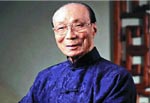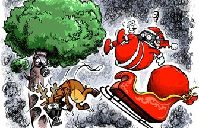Mother tongue gives taste of home
Updated: 2014-01-11 07:56
By Raymond Zhou (China Daily)
|
||||||||
In recent decades, comedian Zhao Benshan stands out for popularizing the northeastern dialect. Words like huyou, which means hoodwink, were hardly heard of in southern China before he pushed it into the national vocabulary via his widely watched television skits.
I don't know where the tipping point was when dialects turned from a communication obstacle to a cherished heritage for Chinese culture. But when I stumbled upon children in my hometown talking to each other in Mandarin while playing on the street, it dawned on me that the days for most dialects are doomed. They would disappear within one generation or two. Possibly within my lifetime, most dialects would go down the road of calligraphy, or worse the abacus, where they would be under academic scrutiny and government protection, but out of the daily use of the common folk.
Efforts to suppress dialects at the current stage of economic development seem well-intentioned but ill-advised. In an era of ubiquitous mass communication and high mobility, sheer necessity determines the importance of Mandarin. Even ethnic minorities who were drilled home bilingual proficiency have to rely on Mandarin to seek work outside their hometowns.
The ability to speak Mandarin should be taught to every child in China. But it does not have to come at the expense of dialects. Children can perfectly handle both Mandarin and a dialect. They are losing interest in the dialect because it is perceived as uncool, partly because it is not the patois of their favorite entertainment. Not everyone has the talent or the platform to create dialect-based shows that click with a nationwide audience as Zhao Benshan has been doing so effectively. But it is time people started to see dialects as an asset, rather than a liability, that can enrich their verbal expressiveness.
With or without government intervention, most dialects will vanish. But there is no sense in hastening their demise. There is a need for dialect programming on local radio and television stations. It is the proportion that should be calibrated. Too much of it may turn off new arrivals who try to fit in. I have noticed a new trend of mixing dialects with Mandarin for some forms of entertainment, which, if you think of it, is an accurate reflection of the current state of linguistic convergence.
Dialects should never be used to discriminate against outsiders who do not know them. All dialects in China, and ethnic languages, are an integral part of our civilization. They may give us local identities and make us proud of the places where we grow up. As long as inter-dialect communication is kept smooth, meaning nobody outside a dialect group is made to feel alienated, there is nothing wrong with sprinkling one's conversation with a sampling of dialect. Sometimes it can be the little act of nonconformity that distinguishes one from the pack. And who knows, some of those dialectal idioms may find their way into the repository of Mandarin and be shared by all in the nation.
For more X-Ray, here

 Gorgeous Liu Tao poses for COSMO magazine
Gorgeous Liu Tao poses for COSMO magazine
 Post-baby Duchess
Post-baby Duchess
 Victoria Beckham S/S 2014 presented during NYFW
Victoria Beckham S/S 2014 presented during NYFW
 'Despicable' minions upset Depp's 'Lone Ranger' at box office
'Despicable' minions upset Depp's 'Lone Ranger' at box office
 'Taken 2' grabs movie box office crown
'Taken 2' grabs movie box office crown
 Rihanna's 'Diamonds' tops UK pop chart
Rihanna's 'Diamonds' tops UK pop chart
 Fans get look at vintage Rolling Stones
Fans get look at vintage Rolling Stones
 Celebrities attend Power of Women event
Celebrities attend Power of Women event
Most Viewed
Editor's Picks

|

|

|

|

|

|
Today's Top News
US to withdraw diplomat at India's request
Top scientists awarded $826,000
Eight foreign scientists win Chinese sci-tech awards
New documents released in NJ bridge scandal
Nation 'has landed trading crown'
US regrets over India's expulsion of American diplomat
Fischer named as Fed vice chairman
China's space policy open to world
US Weekly

|

|










